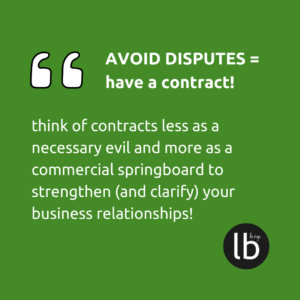It is more common than you might think for business relationships to exist without a formal contract in place. Have you heard some of these popular myths/reasons cited for not needing a contract?
“It will ruin the relationship if the parties get too formal with one another.”
“It will cost too much and take too long to get a contract in place.”
“We don’t need a contract as both parties know each other well and know exactly what the other party needs.”
“We’ve agreed terms on email/verbally. We don’t need anything more.”
“We’re only a small business and we rely on other businesses to show us their terms.”
Sound familiar? Let us dispel some of those common myths and reasons for you!
“It will ruin the relationship if the parties get too formal with one another.”
It’s a commercial world and contracts are a natural and standard part of that world. Business relationships are far more likely to be ruined by ambiguity and misunderstanding than they are by a clear set of contract terms. A set of written contract terms can provide clarity between the parties in terms of who does what and when agreed deadlines or milestones and payment and (most importantly) what should happen if things go wrong. The terms don’t need to be overly formal or extensive if you don’t want them to be (something Lawbox Design holds close to its drafting ethos) but they do need to be clear.
“It will cost too much to go to a law firm and take too long to get a contract in place.”
Yes, contracts don’t draft themselves and may take a little time to put in place but if you have a standard set of goods and/or services to offer or procure, you can put in place a standard set of terms or a template contract to use time and time again. Not only are you protected but you also then have consistency in the terms you agree to. They also don’t need to be overly complicated.
“We don’t need a contract as both parties know each other well and know exactly what the other party needs.”
This works for when the parties are getting along, but what happens if something goes wrong? Ambiguity and the stress of incurring additional costs, losing business, or otherwise can create unintended disputes and breed resentment in even the most amicable of relationships. A contract doesn’t mean the parties cannot be commercial and fair towards one another. It just means that they have a clear set of terms to include what is intended to be delivered and when; and what happens if one party cannot deliver on their obligations in circumstances where it may impact the other party. Plan for the worst and work towards the best.
“We’ve agreed terms on email/verbally. We don’t need anything more.”
Don’t go there! Email agreements are giving rise to more and more litigation by reason of their causing more confusion than clarification. Email chains and fly away sentences in emails can have the (often unintended) effect of creating binding contractual obligations or giving the go-ahead for works/services to be carried out, despite an expectation for at least one of the parties that they will enter into a contract later on down the line to ‘firm up the detail’ being discussed on email. Email can also unintentionally create a situation where one party ends up being caught by the terms and conditions of the other contracting party, which may be incorporated to the exclusion of any other terms. A clear contract can avoid the “battle of the forms” and provide clarity on the contractual terms both parties have agreed (and want) to be included.
As for verbal agreements, recollections can so easily differ especially when things have gone wrong and how feasibly can parties deal with all necessary aspects without writing it down? Need anything more be said?!
“If a contract is all I need, I can easily draft that without a lawyer.”
Contract drafting – can’t be that hard, can it? Yes, it is possible to search out some generic contract terms online or write your own, but do they work for your business and your circumstances? Do they actually stand up to legal scrutiny and (quite simply) work in a contractual context? Contracts aren’t a ‘one size fits all’ solution and bad or very generic contract terms can often be as much of a minefield as no contract at all. The commercial contract lawyers that work with us here at Lawbox Design are pragmatic and approachable and are not looking to make contract drafting any more painful (or expensive) than it needs to be. They do though know what it takes to make a binding contract that will protect you and your business.
In summary, think of contracts less as a necessary evil and more as a commercial springboard to strengthen (and clarify) your business relationships!
find out why we’re different.
If you are someone with a legal need who is looking for a law firm that takes the effort to fully understand your business and it’s unique needs then why don’t you give us a try? You might just find that our lawboxers restore your faith in the profession! Get in touch at onwards@lawboxlegal.com.
